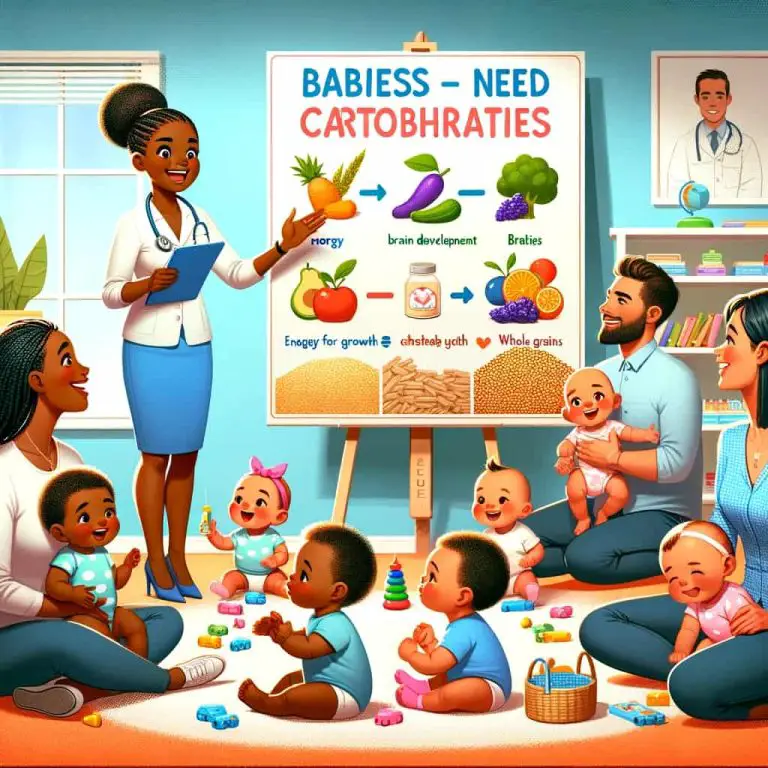Why Do Babies Need Vitamin D? Essential Growth Facts
Babies need vitamin D to facilitate healthy bone development and support their immune system. This vitamin helps their bodies absorb calcium, which is essential for strong bones and teeth.
Vitamin D plays a vital role in the growth and health of infants. Lacking sufficient vitamin D, children may risk developing rickets, a condition that leads to soft, weak bones that can lead to skeletal deformities. In addition to its bone health benefits, vitamin D is important for overall immune function, potentially reducing the risk of infections and chronic health conditions later in life.
Breast milk often contains low levels of vitamin D, and the formula is fortified with only the amount an infant needs. For these reasons, health professionals regularly recommend vitamin D supplementation for babies, particularly those breastfed, to ensure they’re getting the necessary nutrients for optimal growth and health.
Importance Of Vitamin D For Babies
Vitamin D is crucial for infants. It plays a fundamental role in overall development and health maintenance. Let’s dive into why babies need this vital nutrient.
Vital For Bone Development
Babies’ bones grow rapidly and vitamin D is a key player in this process. It helps the body absorb calcium which builds strong bones. A deficiency can lead to rickets, a condition that softens and weakens bones.
Supports Immune System
Vitamin D strengthens the immune system. Strong immunity guards against infections. This nutrient is essential for activating defenses in babies.
Promotes Healthy Growth
- Enhances Muscle Function: Good muscle function supports healthy mobility.
- Supports Heart Health: Vitamin D regulates blood pressure for a healthy heart.
- Improves Mood: It may contribute to a happy and calm demeanor.
Sources Of Vitamin D
The growing bodies of infants require various essential nutrients, and Vitamin D stands out as a critical component for healthy development. It not only supports the growth of strong bones but also plays a significant role in the immune system. Let’s explore the diverse sources of Vitamin D tailored for the youngest members of our families.
Sun Exposure
Sunlight triggers the skin to produce Vitamin D naturally. Just a few minutes of direct sunlight can be enough for a baby’s daily needs. It’s important to balance sun exposure carefully, as a baby’s skin is very sensitive.
Breast Milk
While breast milk is packed with nutrients, it has low levels of Vitamin D. Doctors often recommend Vitamin D drops to complement breastfeeding.
Formula Milk
- Formula milk is fortified with Vitamin D.
- A correct amount can meet a baby’s daily requirements.
Solid Foods
As infants grow, solid foods become a vital Vitamin D source. Here are some rich in Vitamin D:
| Food | Vitamin D Content |
| Cod liver oil | High |
| Fatty fish | High |
| Egg yolks | Moderate |
| Fortified cereals | Variable |
Vitamin D Deficiency In Babies
Little ones need Vitamin D for healthy growth. Without it, they may face several health challenges. This crucial nutrient helps their bodies build strong bones and a powerful immune system. Let’s talk about what happens when babies don’t get enough Vitamin D.
Rickets
Rickets is a bone problem in kids. It makes bones soft and weak. Vitamin D helps bones use calcium. Without Vitamin D, bones cannot harden as they should. This can lead to bowed legs or other bone shape issues.
Weak Immune System
Babies need a strong immune system to fight germs. Vitamin D is a key player in keeping that system fighting fit. Lack of Vitamin D could mean that babies get sick more often.
Delayed Growth And Development
Without Vitamin D, babies may not grow at a normal pace. Their physical and mental development might slow down. This means they could take longer to reach important milestones like sitting up, crawling, or talking.
| Problem | Result |
| Rickets | Soft and deformed bones |
| Weak immune system | More frequent illnesses |
| Delayed growth | Slower development milestones |
To make sure babies get enough Vitamin D, look for these sources:
- Sunlight: Some daily playtime in the sun is great.
- Food: Foods like fish, eggs, and fortified milk add Vitamin D.
- Supplements: Doctors sometimes suggest Vitamin D drops for babies.
Guidelines For Adequate Vitamin D Intake
Vitamin D is crucial for a baby’s growth and bone health. Tiny bodies need it to absorb calcium and phosphorus. It helps avoid rickets, a bone-softening disease. Let’s see how to make sure babies get enough.
Recommended Daily Dose
- Infants 0-12 months: 400 International Units (IU) daily.
- Toddlers 1-3 years: 600 IU per day.
Supplementation For Breastfed Babies
Breastmilk is best but may lack enough Vitamin D. That’s why the American Academy of Pediatrics suggests a daily supplement of 400 IU for all breastfed infants from the first few days of life. Drops are available that meet this requirement.
Choosing The Right Formula Milk
Formula milk can provide Vitamin D. Ensure the formula offers 400 IU per liter. Check labels carefully and consult your pediatrician to select suitable formula options for your baby’s needs.
Introduction Of Vitamin D-rich Foods
At about 6 months, begin introducing foods high in Vitamin D. These include:
| Food | Vitamin D Content |
| Fish (salmon, trout) | High |
| Egg yolks | Moderate |
| Fortified cereals | Variable |
Offer a variety to support healthy development. Always consult with a healthcare provider before making changes to your baby’s diet.
Health Risks Of Vitamin D Deficiency
The importance of Vitamin D extends well beyond adult health.
Babies need this vital nutrient to ensure their bodies develop properly.
Without enough Vitamin D, they face serious health risks.
Let’s explore the key problems associated with Vitamin D deficiency in babies.
Increased Risk Of Infections
A sufficient level of Vitamin D is crucial for a strong immune system.
Babies with low Vitamin D may catch infections more easily.
- Common colds
- Respiratory infections
- Ear infections
These can cause discomfort and lead to more serious conditions.
Poor Bone Health
Vitamin D is essential for calcium absorption and bone growth.
Deficient babies may develop soft bones, a condition known as rickets.
Rickets can lead to:
- Delayed walking
- Bone deformities
- Fractures
Higher Susceptibility To Chronic Diseases
The long-term impact of Vitamin D deficiency includes increased chronic disease risk.
Studies show links between low Vitamin D and:
- Type 1 diabetes
- Multiple sclerosis
- Heart disease later in life
Ensuring babies get enough Vitamin D can help prevent these issues.
Symptoms And Diagnosis Of Vitamin D Deficiency
Vitamin D plays a critical role in bone health and immune function. Babies, especially, need adequate amounts of vitamin D to ensure proper development. Understanding the symptoms and confirmed diagnosis of vitamin D deficiency is essential for the well-being of our little ones.
Common Signs In Babies
Babies can’t tell us when something’s wrong. Watching for telltale signs is key to recognizing vitamin D deficiency early on. Here are common symptoms:
- Slow Growth: Your baby may not be growing as fast as expected.
- Weak Bones: Prone to fractures or deformities.
- Soft Skull: The top of the baby’s head may be softer than normal.
- Fussiness: Excessive crankiness might be a sign.
- Muscle Weakness: Your little one might seem less strong during play.
Medical Tests For Diagnosis
Concerned about your baby’s vitamin D levels? Doctors can confirm a deficiency with simple tests:
- Blood Test: A 25-hydroxy vitamin D test, is the most accurate way to measure how much vitamin D is in the body.
- Physical Exam: Checking for signs of bone problems or growth delays.
Depending on the results, your doctor might order additional tests to rule out other conditions.
| Symptom | Possible Indication |
| Rickets | Soft and weak bones in children. |
| Breathing Difficulties | Low levels of vitamin D can affect bone and muscle health, potentially leading to trouble breathing. |
Prevention And Treatment Of Vitamin D Deficiency
Vitamin D plays a crucial role in the healthy development of babies. This vital nutrient aids in bone growth and ensures a strong immune system. Nevertheless, Vitamin D deficiency remains common among infants. But fear not, there are effective ways to prevent and treat this condition.
Sun Exposure Recommendations
Regular, safe sun exposure helps babies naturally produce Vitamin D. Follow these guidelines:
- A few minutes of sunlight daily, preferably in the morning.
- Protect the baby’s skin with suitable clothing after a short period.
- Keep babies under six months out of direct sunlight.
Supplementation Options
Vitamin D drops are a go-to supplement for infants. Physicians generally recommend:
- 400 international units (IU) for breastfed babies daily.
- Formula-fed babies may require supplements if intake is low.
Modifying Diet
As babies grow, diversifying their diet can boost Vitamin D levels. Include:
| Food Item | Vitamin D Content |
| Fish (salmon, trout) | High |
| Eggs (yolk) | Moderate |
| Fortified foods (cereals, milk) | Variable |
Monitoring And Follow-up
Regular check-ups ensure sufficient Vitamin D levels. Pediatricians may:
- Perform blood tests to monitor levels.
- Adjust supplement dosage as needed.
- Schedule follow-up visits to track progress.
Tips For Ensuring Sufficient Vitamin D Levels In Babies
Every parent wants to ensure their baby grows up healthy and strong. One key nutrient essential for early development is Vitamin D. This vitamin helps in the absorption of calcium, promoting strong bones and healthy growth. But how can you ensure your baby gets enough? Here are practical tips to guarantee your little one maintains sufficient Vitamin D levels.
Promote Safe Sun Exposure
Let the sun smile at your baby, but always with care. Contrary to adults, babies need minimal sun exposure.
- Limited sun—a few minutes before 10 AM or after 4 PM works well.
- Shade and clothing shield against too much sun.
- Never forget a hat or light cover.
Encourage Breastfeeding
Breast milk is liquid gold, packed with nutrients, including Vitamin D.
- Breastfeed as advised by your pediatrician.
- Consult a doctor about Vitamin D supplements if needed.
Choose Fortified Formula Milk
If breastfeeding isn’t an option, formula milk can step in. Ensure it’s fortified with Vitamin D.
- Check labels for Vitamin D fortification.
- Follow guidelines—prepare the formula as directed.
Introduce Vitamin D-rich Foods
As babies grow, introduce foods to nourish with Vitamin D. Monitor for allergies.
- Fish like salmon or tuna
- Eggs, particularly the yolks
- Cheese and fortified yogurts
Frequently Asked Questions On Why Do Babies Need Vitamin D?
Are Vitamin D Drops Necessary For Babies?
Vitamin D drops are essential for babies who receive less than 400 IU/day from food or sunshine to support bone health and growth.
What Happens If I Don’t Give Vitamin D To My Baby?
Not giving vitamin D to your baby may lead to vitamin D deficiency. This can cause rickets, a condition that softens and weakens bones, potentially resulting in bone deformities.
What Happens To Babies With Vitamin D Deficiency?
Babies with vitamin D deficiency can develop rickets, leading to soft, weak bones, growth delays, and skeletal deformities. They might also experience muscle weakness and immune system challenges. Prompt treatment and prevention are crucial for their health.
What Does Vitamin D Do To Your Baby?
Vitamin D helps your baby develop strong bones and teeth by aiding calcium absorption. It also supports their immune system and muscle function.
Conclusion
Ensuring your little one receives enough vitamin D is crucial for their development. This nutrient supports bone strength and immune health. By focusing on adequate intake, you’re setting the foundation for a healthier start in life. Remember, a simple blend of sunlight, diet, and supplements can keep deficiencies at bay and nurture your baby’s growth.







